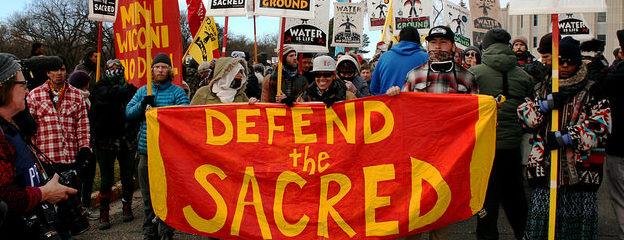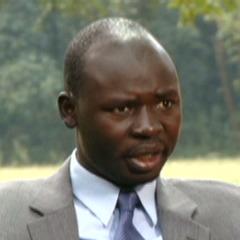Africa to Standing Rock: “It happened to us too. It is happening to us too.”

In the water protectors’ struggle, there are whispers of Saro-Wiwa, Biko and Sankara.

Marginalised communities from around the world have long been expected to sacrifice their land and resources to visions of progress that are both exclusionary and externally-defined. Credit: Leslie Peterson.
After facing attack dogs, tear gas, arrest, water cannons, and rubber bullets, the protesters at Standing Rock – known as “water protectors” – won a significant victory earlier this week. Following months of demonstrations, the Army Corps of Engineers, a US federal agency, rejected a permit for the Dakota Access Pipeline (DAPL) from proceeding on its expected route under the Missouri River at Lake Oahe.
The companies behind the proposed oil pipeline immediately fired back, rejecting additional rerouting and blasting the US government for “abandon[ing] the rule of law…and currying favor with a narrow and extreme political constituency”. The water protectors, made up of thousands of Native American and environmental activists afraid that the pipeline would contaminate the waters and destroy sacred sites, finally celebrated.
Although taking place thousands of miles away, there is something very familiar about the standoff at Standing Rock from the vantage point of the African continent. Just a few weeks ago, more than 40,000 Nigerian citizens brought a case against Shell to the British High Court. The first exhibit? Four bottles of benzene-contaminated water from the Niger Delta.
[Shell tries to dodge responsibility for Nigeria oil spills…again]
The week prior, Suelma Beirouk, a political leader from occupied Western Sahara was detained by Moroccan police for attempting to attend the 2016 UN Climate Change Conference in Marrakesh. Presumably, the Moroccan government feared her message of occupation would disrupt its attempts to present itself as a global environmental leader.
For Jodi Gillette, former White House advisor for Native American Affairs, the growth of the #NoDAPL protests was a matter of spiritual solidarity. “Really awful things happen to different tribes; and it’s so deeply spiritually wounding that…when people see it happen to other tribes, our spirit is called to act, because it happened to us,” she said.
Indeed, we who identify with these generations of suffering are found beyond the borders of the Native American community and the US. Marginalised communities from around the world have long been expected to sacrifice their land and resources to visions of progress that are both exclusionary and externally-defined. In Africa, “development” has often been the mask pulled over economic and environmental violence.
[What if everything the SDGs are premised on is just wrong?]
And so Standing Rock echoes in our spirit because, as Gillette says, it happened to us too. It is happening to us too.
When proponents of the Dakota Access Pipeline insist that America’s freedom from foreign oil depends on this pipeline, one immediately recalls 1990s Nigeria. When Ken Saro-Wiwa and the Movement for the Survival of the Ogoni People (MOSOP) began to target Shell for its atrocities in the Delta, Nigeria’s government made “disturbing oil production” an act of treason. Pitting national economic progress against the lives of indigenous people is well-trodden ground.
Similarly, when North Dakota governor Jack Dalrymple claimed that evacuating the Standing Rock camps would protect the health and safety of water protectors, he sounded suspiciously like Cecil Rhodes declaring empire an act of philanthropy.
[Enough! Will youth protests drive social change in Africa?]
Shared struggles
For far too long, marginalised communities have been subject to visions of development that grind up their local interests as fuel for notions of national prosperity. If they dare to dream differently about the future, they are brutalised.
But those gathered at Standing Rock beckon us beyond this false opposition. For instance, last week, Kandi Mossett/Eagle Woman (Mandan/Hidatsa/Arikara) described the water protectors’ plans to survive the winter as an opportunity to “take back the narrative” by modeling a progress that sacrifices neither the earth nor future generations.
“We’re not just stopping a pipeline here, but showing what we can be, what we can build, by bringing in solar, by bringing in wind, and it’s our own Native people,” she said. “We’re going to stop a pipeline, we’re going to celebrate our future, and we’re going to create that platform, and that community, that eco-village for them, for generations to come.”
In these words, there are whispers of Ken Saro-Wiwa’s prediction that victory is inevitable for those who work for a cause from which they cannot be blackmailed or intimidated. The images of elders holding drums, praying and singing while police blast them with freezing water call to mind Steve Biko’s insistence that self-knowledge and culture are the paths to liberation. For all of us, Standing Rock is a site of both devastating privation and dazzling prophetic leadership; it invokes Thomas Sankara’s invocation of a country “brimming with all the misfortunes of the people of the world… but also – and above all – the promise of our struggles.”
This struggle against the Dakota pipeline extends far beyond US national borders. Using ceremony and prayer as weapons of choice, the water protectors stand against a generations-old doctrine of exploitation and its reconfiguration as national progress. They expose how the language of “caretaking” and “human rights” is still being deployed as accompaniment and ornament to brutality. And their victory, however temporary or partial, reminds us that development does not need to happen over the bruised and broken bodies of the land’s people. If it does, it should at least be called something else. “Colonialism” comes to mind.
Abena Ampofoa Asare is Assistant Professor of Modern African Affairs at SUNY- Stony Brook University. She writes and teaches about how African political and social movements are transforming international human rights.







Thanks Abena for putting together important human rights concerns from different regions.